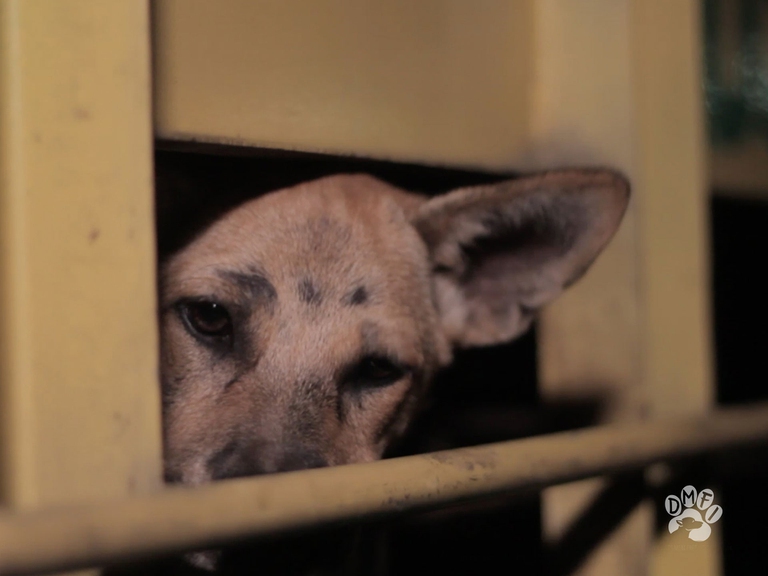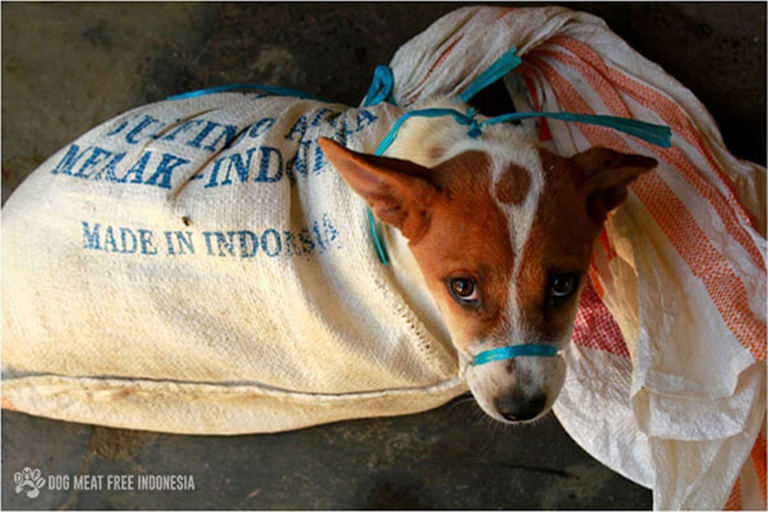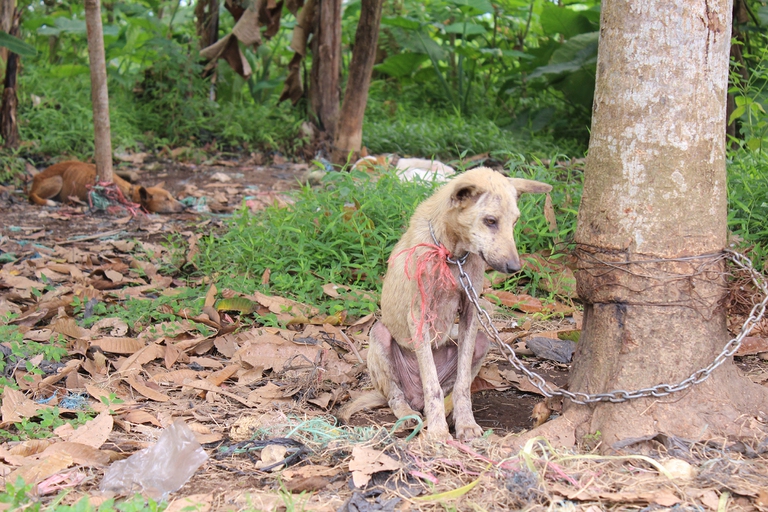https://www.lifegate.it/carne-di-cane-asia
- |
There are thirty million dogs and ten million cats every year Asia they are killed for the trade and consumption of their meat, to satisfy demand in countries such as China, Vietnam, Indonesia and South Korea.Although the cruelty inflicted on the animals that are victims is the same, this business has different dynamics in each of the countries in which it is present.

For over a decade, Humane Society International operates and intervenes in these four countries to put an end to this cruel trade, with campaigns aimed at increasing public and political support and with initiatives that have led to the closure of 18 meat dog farms in South Korea and to as many rescue operations in Vietnam, Indonesia and Yulin, China.
Dog meat:the situation in China
Although the numbers are terrifying - there is talk of at least ten million dogs and four million cats killed and consumed - contrary to what one might think, the consumption of dogs and cats is not very widespread in China.In fact, dog meat is only rarely consumed by 20 percent of Chinese and 52 percent favor a ban on its consumption.This trade is mainly concentrated in southern, central and northeastern China.Certainly the city most associated with dog and cat meat is that of Yulin which annually hosts the infamous "festival".However, a 2017 survey revealed that even in Yulin, 72 percent of residents do not regularly eat dog meat, despite traders' efforts to promote it.In its first edition, an estimated 15 thousand dogs were killed;recently the figure has been reduced to three thousand.

The trade in dog and cat meat in China it is strongly fueled by criminal activity, as it mostly involves stolen pets and strays caught off the streets.Those who carry out these acts are rarely identified and legally prosecuted.To reach slaughterhouses and markets, animals are crammed into metal cages and transported for hours or even days, in some cases causing the animals to die from dehydration, heat stroke or suffocation.Since there are no laws against animal abuse, the methods to kill those who survive the journey are extremely cruel such as drowning or beating.In 2020, the Chinese Ministry of Agriculture and Rural Affairs officially declared that dogs are considered pets and not "livestock" intended for consumption.The announcement came with the publication by the Ministry ofList of livestock and poultry genetic resources (Directory of genetic resources of livestock and poultry).In the same year, two major cities in China – Shenzhen And Zhuhai – have banned the consumption of dog and cat meat, a decision supported by the polls by nearly 75 percent of Chinese citizens.
Dog meat in Indonesia
In Indonesia, more than one million dogs and countless cats are killed every year, most of which are strays or stolen and illegally trafficked pets towards the centers where there is greater demand.Here too, many of them die during the journey due to exposure to temperatures or due to injuries sustained during capture and transport.Those who survive are taken to makeshift slaughterhouses where they are beaten to death.At the national level, Indonesian legislation does not contain rules that explicitly prohibit the trade and slaughter of dogs for human consumption.However, there are numerous regulations and laws regarding consumer safety, public violence, livestock transportation, animal abuse and theft, as well as animal husbandry and animal health that, if properly and rigorously enforced, could dramatically reduce , if not stop, the dog meat trade.A survey of January 2021, revealed that 93 percent of Indonesians support a national ban and that only 4.5 percent have consumed dog meat in their lifetime.Even though it is a minority, its demand threatens the security of the entire country.

In fact, in Indonesia, in addition to cruelty, the consumption of dog meat is linked to spread of rabies, with evidence also reported by the World Health Organization.Since the movement of these animals between different cities, provinces and islands is unregulated, it is easy for rabies-positive dogs to go undetected and end up in consumer hot-spots, including those areas that have worked tirelessly to eradicate rabies, such as capital Jakarta.To respond to this problem, the Food, Maritime and Fisheries Security Service of Jakarta has recently published a ban with the aim of limiting the trafficking of animals that can transmit rabies and non-food animal products, for reasons of public health protection.The provision concerns the so-called Special Area of Jakarta City, Indonesia's most populous metropolitan area, comprising the capital, five satellite cities, and three full regencies, including parts of the western provinces of Java and Banten.Dog meat trade is now banned in 21 cities and regencies in Indonesia:Karanganyar, Sukoharjo, Semarang, Blora, Brebes, Purbalingga, Mojokerto, Temanggung, Jepara and Magelang;Salatiga, Malang, Semarang, Magelang, Blitar, Mojokerto, Medan, Surabaya and from March 2023 also in the capital Jakarta.
Vietnam
It is estimated that around five million dogs and one million cats are trafficked and slaughtered in Vietnam every year.This trade involves immense cruelty to animals and criminal activities since, as in China, most animals are stolen from their families or captured off the streets.While the sale and consumption of dog meat is not illegal in the country, the untracked trans-provincial movement of dogs has been banned since 2009 and pet theft was made a criminal offense in 2016.Although several cities, including Hanoi and Hoi An, have made efforts to end the trade, the laws are rarely enforced.Unlike most other Asian countries, in Vietnam the consumption of dog meat is more widespread and is the dish of choice for special occasions.A recent one survey found, for example, that eleven percent of the inhabitants of Hanoi consume it on average at least once a month.Although there is no scientific proof, popular belief attributes medicinal and male virility-enhancing properties to dog meat.Even in Vietnam, public health and safety are threatened by anger which kills around seventy people every year.Predominantly these cases are linked to dog bites and a significant number are directly linked to the slaughter and consumption of dogs.A 2016-2017 study of samples taken from dogs from Hanoi slaughterhouses, carried out in collaboration with the National Veterinary Diagnostic Center of Vietnam, revealed that one in a hundred dogs had rabies.
South Korea
Unlike China, Indonesia and Vietnam, in South Korea dogs are intended for human consumption they are raised. In addition to Jindos – the national breed – and mastiffs typically raised for their meat, many facilities also raise Labradors, Golden retrievers, Cocker spaniels, Huskies, Beagles and other breeds.It is estimated that there could be around one and a half million dogs, kept in more than a thousand breeding facilities across the country.Confined in small wire cages, with little food and water, without stimulation, comfort, shelter or adequate veterinary care, they suffer immensely both physically and psychologically.Death occurs by electrocution.According to the Korea Times:“Fewer and fewer people are eating dog in Seoul, as nearly forty percent of restaurants that sold dog meat have closed in the last ten years.”Although i polls show that most people in South Korea (84 percent) do not eat dog meat, the belief that dog soup provides relief during the summer heat and increases strength is still widespread, particularly among older generations .In fact, among Koreans who eat it, seventy percent do so during the Bok Nal season, between July and August.Nearly sixty percent of the population supports a ban on the dog meat trade.Recent actions by authorities to curb this business include the November 2018 closure of the Taepyeong dog slaughter (the largest in the country) by the Seongnam City Council, followed in July 2019 by the closure of Gupo Market in Busan.In October 2019, the mayor of Seoul declared the city “free from dog slaughter.”In December 2021, the South Korean government established an inter-ministerial task force to work on a ban, and in 2022, first lady Kim Keon-hee expressed publicly in favor of this legislative intervention.
Models for change
In 2015 Humane Society International launched the program “Models for change” which allowed us to do so close 18 farms in South Korea, saving over 2,700 dogs, otherwise destined for human consumption.The collaborative, rather than comforting, approach is aimed at supporting farmers who wish to cease their activity and start an alternative, profitable business that does not involve the exploitation of animals, such as growing vegetables.This model allows us to demonstrate to the South Korean government that with the right incentives and support, farmers and traders are willing to change.In 2022 the same program was also launched in Vietnam, leading to the first closure of a dog and cat slaughterhouse last November.Across Asia, the trade, slaughter, sale and consumption of dogs are already banned or ended in Taiwan, Hong Kong, the Philippines and Thailand.With concrete programs and direct interventions, the objective of Humane Society International is to fuel public and political support for the introduction of bans in countries that still do not have them, thus contributing to avoiding atrocious suffering and ignoble deaths for millions of dogs and cats.




